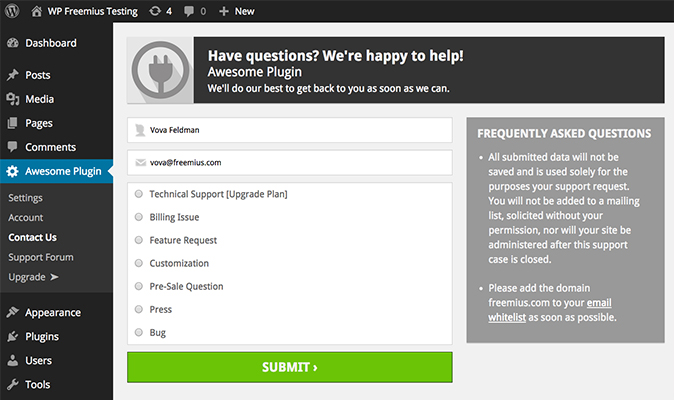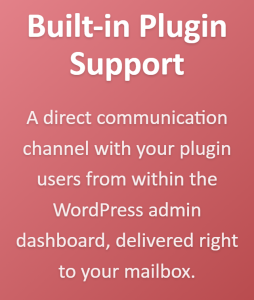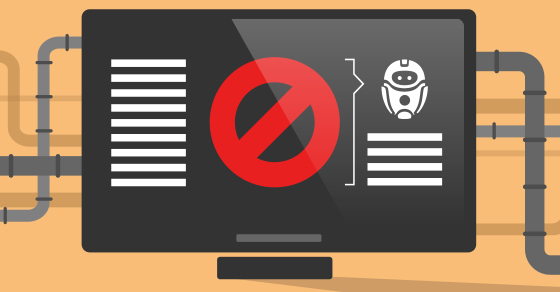|
|
No matter how brilliant your plugin is, or how well it’s been coded, you’re going to need some kind of customer support system in place if you care about your brand and your reputation.
These days, support just isn’t optional for serious developers who treat their brands like a business. Customers will expect great service and support. If they don’t get great support, or if there’s a breakdown in how it’s delivered, it can wreak serious havoc on a developer or business.
Social media crises erupt around hapless brands that didn’t take customer support obligations seriously on a regular basis. You’ve undoubtedly seen or at least read about a few yourself, like these unfortunate social media fails.
And you don’t want that to happen to your business.
On the flip side, offering high-quality support helps you market your plugins to your ideal customers by creating a significant benefit that differentiates your plugin from the competition.

Stellar customer support also keeps your current users and customers satisfied — so when you add to your plugin offers, or eventually, add a premium level, they’ll come back again and again and happily give you money.
Offer high-quality support to create a significant benefit that differentiates your plugin from the competition.
So bad support is bad for business, while excellent customer support can help you grow your business — and increase your sales.
But how are you supposed to offer that superior level of customer support without spending huge amounts of money to employ a bunch of support specialists?
Well, it all starts with knowing your business and your customers pretty well.
Specifically, you need to answer two questions …
How Much Support Do You — and They — Need?
When it comes to customer support, many individual developers start simply and small. An email address that you personally monitor and respond to is certainly simple and small — but it isn’t scalable.
It could very well be all you need in the beginning but even so, at some point it’s almost guaranteed that your abilities and time will be swamped by the demands of a growing customer base.
If you’re serious about growing your business, then you need to devote time to development and planning, as well. Ultimately, you’ll need a better system — preferably one that’ll grow with you.
Another consideration is the complexity of your plugin. For instance, a plugin with minimal or no settings to configure is likely to need a less comprehensive solution than one with complex multi-tiered submenus that need to be configured.
One great way to get an idea of what your users will require and expect is to look through the websites of other plugin developers. This kind of “competitive analysis” is especially helpful if the developer in question is an actual competitor. It’s a common practice, and not at all unethical — as long as you’re above-board and look only at the publicly available information.
As you’re perusing other developers’ sites, try to put yourself in the shoes of a typical user. In other words, think like your customer – not like another developer.
To understand what will your plugin users require – think like your customer – not like another developer.
Ask yourself the following questions:
- What kinds of support systems do they have in place?
- Do they provide an extensive “knowledge library” for new users?
- How is their support content organized? What labels do they use for sections and navigation?
- Have they recorded and made available screencast tutorials, or is everything text-based?
- How robust and on-point are their search functions? Remember, frustrated searchers often blame the site owner, rightly or wrongly — yes, even if they’re not “searching for the right thing.”
Getting an idea of what other developers are doing to handle customer support is a great way to get started in creating your own system.
What Kind of Support Do They Want?
Different kinds of audiences prefer different kinds of support. It seems obvious when you think about it, but offering your customers the kind of support they’re most comfortable with can yield serious goodwill and increase referrals. On the other hand, offering the wrong kind of support will leave customers feeling dissatisfied — or worse.
Variations in age, technical background and technology comfort level can all affect what kind of support your user base prefers.
Here’s an example: did you know that older consumers (say, 55 and up) don’t like using chat boxes? Generally speaking, customers in this age group prefer phone calls with live support representatives.
On the other hand, millennials actually prefer the chat box.
Different kinds of audiences prefer different kinds of support.
So, once again we see that it pays to know your customer base and what their preferences are.
How can you find out this kind of information? Well the easiest method is to simply ask them. You can create a simple survey and ask your current customers to take a minute or two to fill it out.
It doesn’t have to be a terribly complex survey. Even a single question on SurveyMonkey.com can give you useful data that’ll help you make the right decision. The customer support systems for businesses include knowledge wikis, ticket systems, social media, email, and telephone-based systems.
So you’ve got several options you can choose from.
One customer support option specifically for plugin developers that’s fairly new — and a potential game-changer — is the Freemius support feature.

Freemius, provider of a leading monetization platform for WordPress plugin developers, offers you the opportunity to enable your customers to request and receive support right from their own WordPress Dashboards.
Your customers won’t have to hop off their sites, head to your site, figure out how to submit a customer support ticket, then compose and send their request. They can do it all right from their own site’s Dashboard, which is usually where the need for plugin support arises in the first place.
That kind of convenience and on-the-spot handling has the potential to make your plugin customers insanely happy.
What’s more, Dashboard support can easily be integrated with a number of support management systems, such as Help Scout, for even smoother support and ticket management.
Tips for Improving Customer Service for Your Plugin
Customers usually know when they’re getting canned responses–they don’t like it.
No matter what kind of system you ultimately put in place, you can improve your customer support — and your customer’s level of satisfaction — with these tips:
- Every so often, make it a point to check in with your user base. Give them the opportunity to provide feedback.
- When you get that feedback, listen to what your users are saying. If you receive requests for new features, changes, etc., give some thought to implementing them if it makes sense – and let them know you’re following through on their suggestions.
- Systemize whatever you can. It’s always easier to rely on a prescribed routine than feeling like you’re reinventing the wheel every time. Look for ways to cut back on repeated tasks.
- However, don’t rely solely on canned answers. Customers usually know when they’re getting canned responses, and they usually don’t like it. Ideally, you need a mix of human and automatic input.
- Don’t rely on a single system. If possible, create a few complementary resources – e.g., a knowledge wiki and a ticket system can supplement each other and provide the right mix of information and how-to’s your users are looking for.
Conclusion
Offering stellar customer support may no longer be optional, but that’s a good thing. With so many options available, you’re sure to find the system that works for you with a little careful thought and planning.
Whatever system you choose — we do like Freemius’s in-Dashboard feature — commit to it and treat it like the value-added user benefit it is if you want to increase your customer base and grow your plugin development business!











Comments
1 Comments